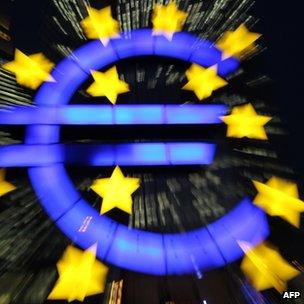Which are the eurozone's zombie banks?
- Published
- comments

It is not an ideal time of year to judge conditions in banking markets, because so much real business closes down over Christmas and new year.
But even allowing for that distortion, what's going on at eurozone banks is troubling.
Here are the relevant statistics.
On 21 December, the European Central Bank provided an unprecedented 489bn euros of three-year loans to the eurozone's banks. That represented a net addition of central bank lending to the banks of 191bn euros (because some banks converted shorter term ECB loans into three-year loans).
Now at that time of year, you wouldn't expect the banks to put all that net 191bn euros of new money to work in a proper sense: it will take time for that money to be used repaying the banks' own debts that fall due for repayment, or providing new loans to customers.
So inevitably a lot of it would end up back at the European Central Bank, on deposit overnight.
Taking a loss
Even so, more money has been put on deposit at the European Central Bank since the auction of three-year loans than the 191bn euros of new money that was made available: on 20 December, banks deposited 251bn euros overnight at the ECB; last night they deposited 453bn euros overnight.
In some ways, this is a totally barmy way for a bank to behave: the banks are borrowing at 1% from the ECB and then lending the money back to the ECB at 0.25%. Or to put it another way, they are taking a substantial loss on their dealings with the central bank.
Why on earth would they do this?
Well, as I've said many times before, it is because they would rather be sure their money is safe and easy to get their mitts on, than take the risk of obtaining a higher interest rate by lending the cash to other banks. It's a sign of how worried they are about the health of banks and the banking system.
Still short of cash
But actually for me there is a more troubling ECB statistic - which is that eurozone banks last night borrowed 15bn euros overnight from the central bank (and a little less on Monday but a bit more at the end of last week).
Why does this matter?
Well the European Central Bank has just pumped an astonishing amount of new loans into the banking system. And yet there are some banks out there which are still short of cash - and are unable to borrow it from other banks, financial institutions or commercial customers.
These shunned banks have to resort to paying 1.75% to the European Central Bank for this emergency overnight money. And given the way they are being forced to live hand to mouth in this way, dependent on central bank support, they can be seen as zombie banks.
The big point, as I've said before, is that a substantial portion of the eurozone banking system has failed, and is on a drip provided by the ECB. But the scale of disease will be better assessed in two or three weeks' time, when the holidays are properly over and seasonal factors can no longer be cited for banks being on life support.